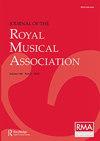‘A crazy clutter of the mediaeval, medical mind’: Ken Russell, Peter Maxwell Davies and Modernist Medievalism in The Devils
IF 0.5
2区 艺术学
0 MUSIC
引用次数: 0
Abstract
Abstract Ken Russell’s 1971 film The Devils is a shocking historical drama which, eclipsed by its own battle against censorship, has only recently had a critical revival. A landmark musical collaboration central to that film remains unexplored: Peter Maxwell Davies wrote the score, which is heard in tandem with ‘period’ performances from David Munrow and the Early Music Consort of London. Though ostensibly historical, the film’s disruptive atemporal style is elevated through an art of stylized anachronism. This collaboration mirrors Davies’s opera Taverner (premièred in 1972), not only because that too featured Munrow and his consort but also because Russell was supposed to direct its première. This article posits Davies’s film score as a compelling work combining historicist compositional interests and a challenging aesthetic of excess within the popular context of mass cinematic spectacle. Informed by the close study of Davies’s own manuscripts, it argues for new ways of understanding the role of a persistent past in the music of a resolutely modernist present.“中世纪医学思想的疯狂混乱”:肯·罗素、彼得·麦克斯韦尔·戴维斯和《魔鬼》中的现代主义中世纪主义
肯·罗素1971年执导的电影《魔鬼》是一部令人震惊的历史题材影片,它因与审查制度的斗争而黯然失色,直到最近才重新获得评论界的关注。这部电影中具有里程碑意义的音乐合作仍未得到探索:彼得·麦克斯韦尔·戴维斯(Peter Maxwell Davies)为这部电影写了配乐,并与大卫·芒罗(David Munrow)和伦敦早期音乐乐团(Early Music Consort of London)的“时代”表演结合在一起。虽然表面上看是历史题材,但影片颠覆性的时空风格通过一种程式化的时代错误艺术得以提升。这次合作反映了戴维斯的歌剧《塔弗纳》(1972年首演),不仅因为那部歌剧也有芒罗和他的配偶,还因为罗素本应执导这部歌剧的首演。本文认为戴维斯的电影配乐是一部引人注目的作品,结合了历史主义的作曲兴趣和在大众电影奇观的流行背景下具有挑战性的过度美学。通过对戴维斯自己的手稿的深入研究,这本书提出了一种新的方式来理解在坚决的现代主义当下的音乐中,持久的过去所起的作用。
本文章由计算机程序翻译,如有差异,请以英文原文为准。
求助全文
约1分钟内获得全文
求助全文
来源期刊
CiteScore
0.50
自引率
0.00%
发文量
16
期刊介绍:
The Journal of the Royal Musical Association was established in 1986 (replacing the Association"s Proceedings) and is now one of the major international refereed journals in its field. Its editorial policy is to publish outstanding articles in fields ranging from historical and critical musicology to theory and analysis, ethnomusicology, and popular music studies. The journal works to disseminate knowledge across the discipline and communicate specialist perspectives to a broad readership, while maintaining the highest scholarly standards.

 求助内容:
求助内容: 应助结果提醒方式:
应助结果提醒方式:


